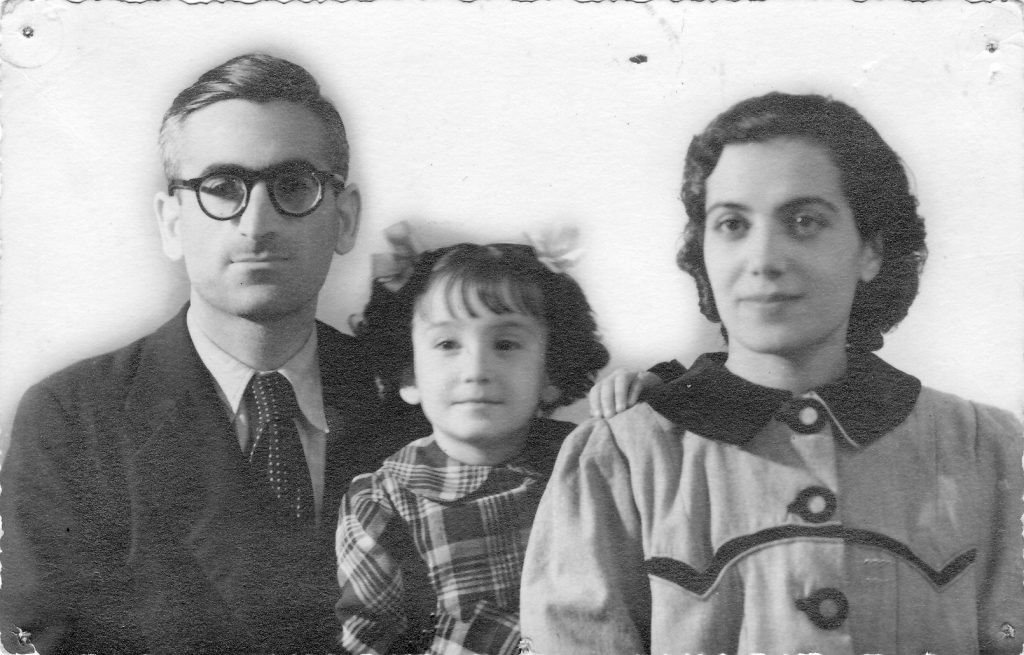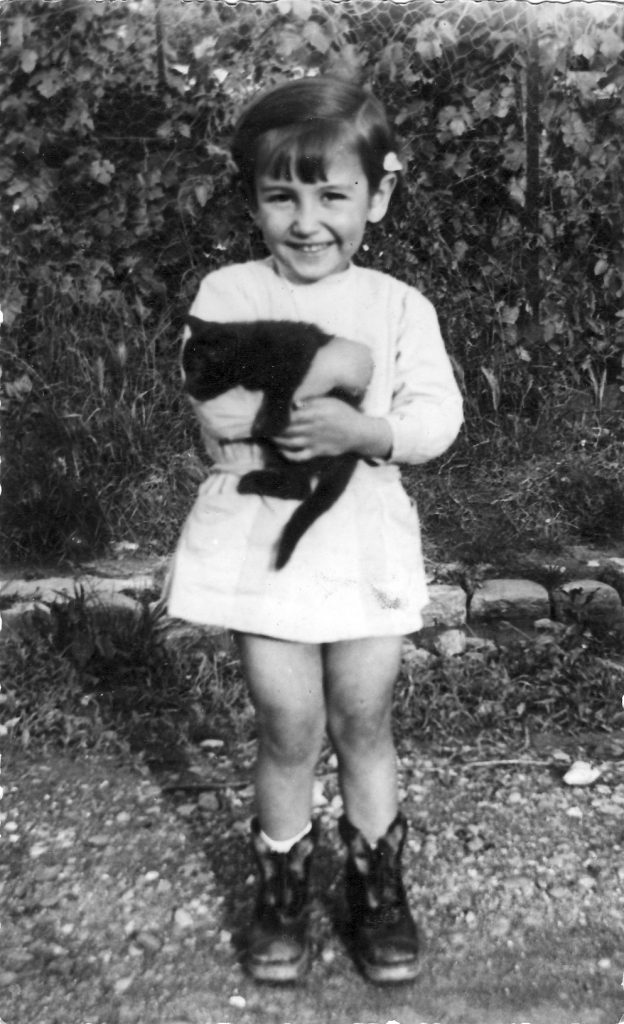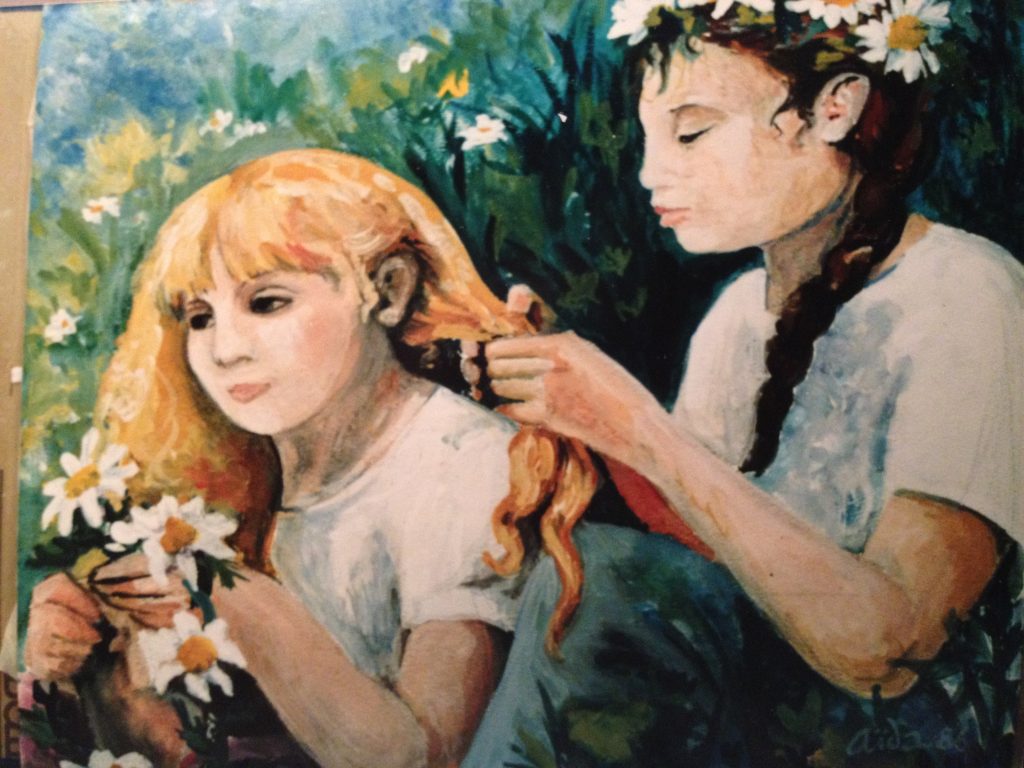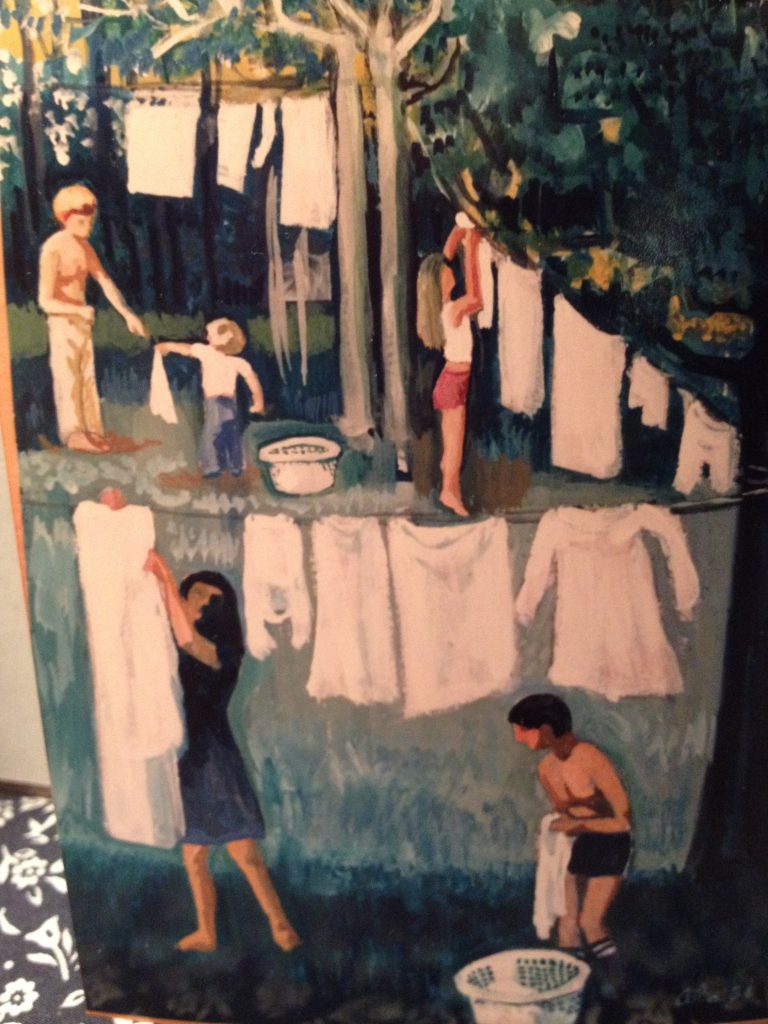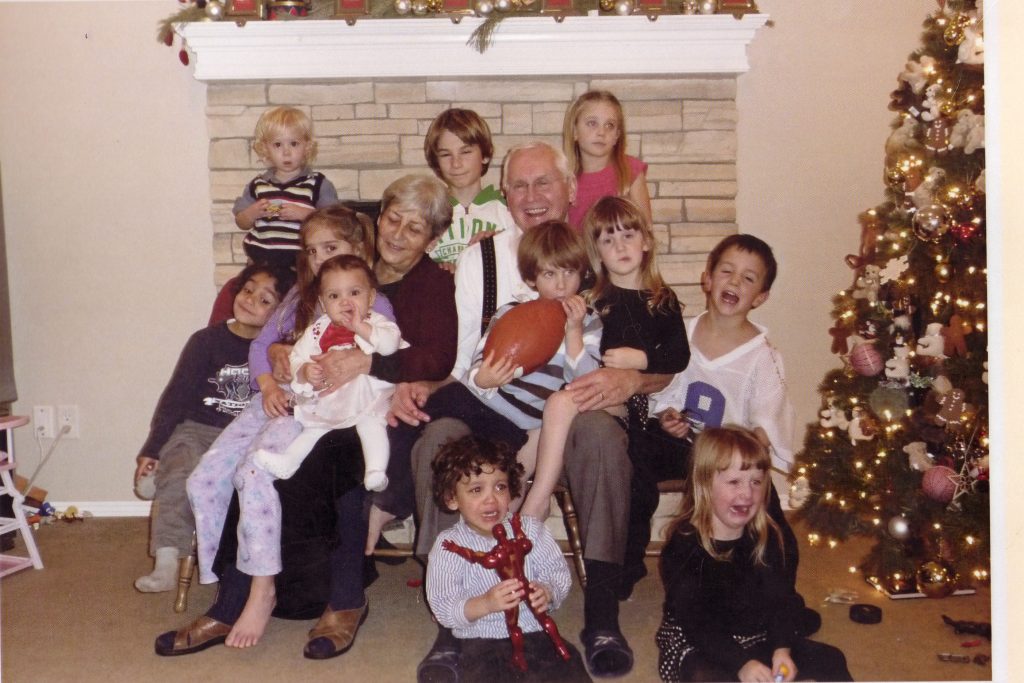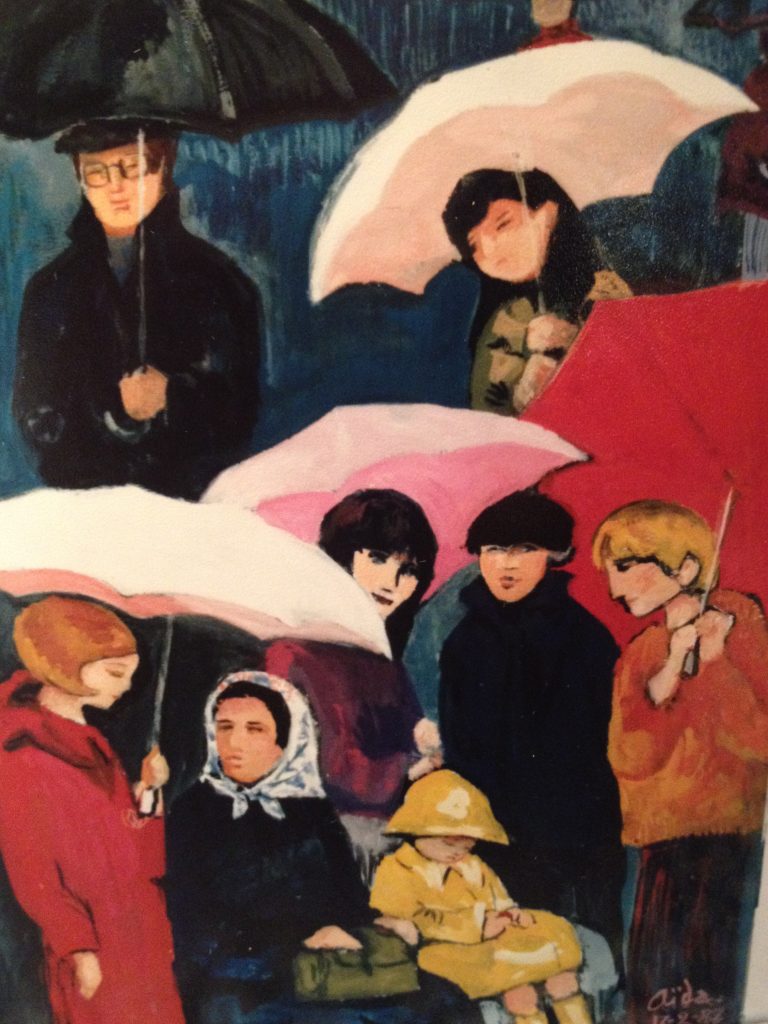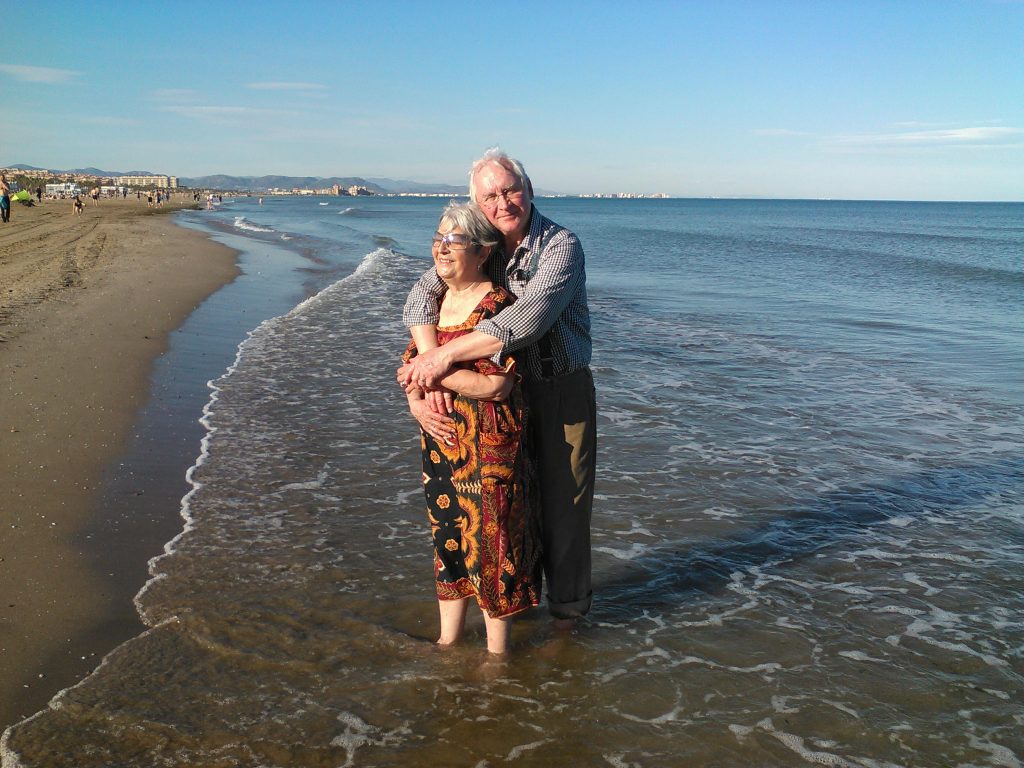As a refugee of the Spanish Civil War, Aïda was raised in France with two families: her Spanish family of birth and her adopted French host family. Her love of languages and art led to a rich life of creation as she wrote and illustrated children’s books and raised three children in Ottawa, Canada. As her sight has failed her in her later years, Aïda continues to fill her life with beauty.
Let’s start with your childhood. You were a refugee from the Spanish Civil War in 1939, moving to a refugee camp in France with your mother. I imagine that you don’t remember much about Spain since you were very young when you left, but what were your first experiences as a refugee from the Spanish Civil War?
Yes, I arrived in France at the age of three. It was a time that was very hard in my parents’ lives: they had only been married four years. They were very happy together, but my father was very involved in the defense of Spain’s legal government. So, at the time the war in Spain broke out, when he saw that things were lost, he stayed behind to try to destroy everything that could have implicated the most involved people and caused them to be taken and shot. He had gotten wind of a plane coming from Morocco, and it was the last plane that was going to stop in Alicante. We lived in Valencia, and he managed to find us seats on this plane that was stopping in Alicante, and my Mother and I left.
It was not terribly difficult for me, I don’t have many memories from that time except that I was very happy, and then all of a sudden I was hurled into this plane without knowing what was happening. The plane landed in Toulouse, and we were eventually brought to a shelter, where all the refugees who arrived from Spain were put. For me, it wasn’t hard at all, because it was still new, but my mother cried all the time, so I would say, “Why are you crying? Why are you crying?” and she’d say, “It’s nothing. It’s nothing.” She’d say, “You’re going to see your papa again,” and all that. So, I was fine there; we were given food, they took good care of us.
But this was 1939, so we arrived just before World War II was declared. There was one French family who came to visit and see how they could help the refugees, and they felt a connection with us. They had boys and had always wanted a little girl, and the mom was still hoping to get pregnant, so she saw in me a little girl who was constantly babbling away and she was touched. And there was my mother, who seemed so alone… Eventually they invited us to their home and it was love at first sight: grandparents, other children…Then, I saw a little bed. When no one was looking, I fell asleep in it, and that was incredible. Everything felt good, I was saying, “Oh, it’s so nice here; it’s better than at the shelter!” and then the fact that I fell asleep in this bed, the husband said to my mother, “My wife has always wanted to have a sister. Would you be that sister? I want you to come home with us, not to come help us and be a servant, but to be my wife’s sister and live with us.” And of course the war had broken out in the meantime and my mother finally accepted, because she felt that it was truly sincere.
Thanks to this family, a year later, when my father was able to escape from Spain and had been captured and sent to a camp in Argelès-sur-Mer, they moved heaven and earth and managed to get my father out. We stayed there the whole time during the war. It still wasn’t difficult for me, because I had left my family in Spain, but I had found a family in France. I found myself in France with two complete sets of grandparents, with a new mother in addition to mine, a new father in addition to mine, (besides, during the first year when I didn’t have one, he was my replacement father), and a brother, a cousin, a whole family! It was total integration, it’s truly my family, and now I even do genealogy for them.
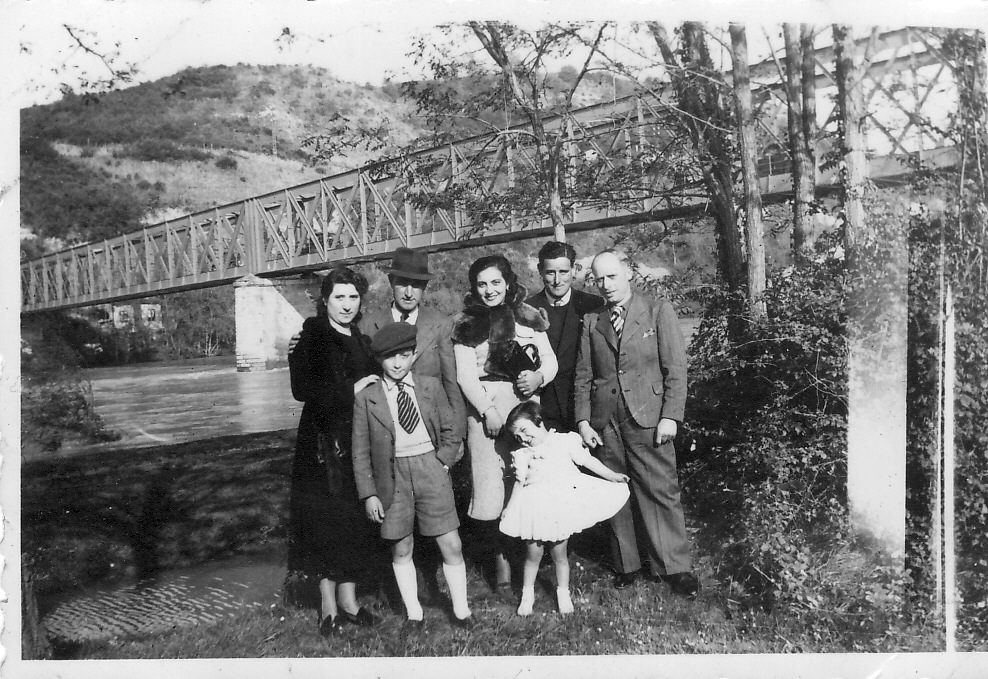
My mother and me in the middle with the Dussels on the left, (Christian, Barthélémy et Bernadette), and on the right two family friends, upon our arrival in Toulouse
For a girl who loved stories so much, at four years old I was in school, and at school, it was extraordinary: I found all sorts of things that I loved. In Spain I had always been on the ground drawing, Mother would say that I was already drawing before I could walk. I arrived at school and I had crayons, paper, we would cut things out, we would talk, we would sing songs–I loved that, singing–so, it was marvelous! At home, all this love, this whole cocoon around me, it was wonderful! And the language, I loved right away. I wanted to learn to read; everywhere I would say, “What’s written there? What does this say?”
When my father arrived a year later, he was so happy, but all of a sudden he saw this little girl who before had spoken constantly in Spanish, and now, there, he was seeing a little girl who was speaking in French… Well, it was a shock! And me, I looked at him, and I didn’t recognize him either because he had lost so much weight, he had a beard, he who I always saw in a neat white shirt… Horrible, to have been hidden for a year in Spain… It was terrible, so I was a little apprehensive. But fittingly, he had seen that I was really loving words, and he said to me, “I am going to teach you to read.” So, I learned to read in Spanish with him, and in French with my French family.
Those were difficult years; my father had to work for the Germans in Bordeaux, Toulouse had been bombed, but we found ourselves forming a new family with this family. This new family was not linked by blood, but was first and foremost linked by a sort of humanity, by a real unconditional love, and by the love that had grown between us.
All this made it so that when I found the Church, for me, it was everything I had always believed: that love was eternal, and that there was life after death–of course! It was so extraordinary, the way in which I had been raised by my parents: my parents didn’t drink, didn’t smoke, my father came home one day and said, “We should fast once each month. That would be better for our health!” But my parents had suffered so much because of the Catholic Church in Spain, they were anti-religious. My father was atheist, but he always cared about his neighbor. Everything he did was for the wellbeing of people who were living and would live after him. He did it for his children and his grand-children, whether he would know them or not, so that the world would be a better place. So really, I had the best of educations.
How did you come in contact with the Church?
I believe that I am always guided in life; I left my country, but there was a reason. It’s a terrible reason, but there was a reason. I met another family who nourished me: intellectually, emotionally, culturally… When I went to Paris, I studied painting, but I couldn’t find a job because obviously drawing doesn’t put food on the table. So, I responded to an ad looking for a French teacher in Switzerland in a private school.
I had always believed in God. I had always prayed, since I was little, I prayed, and I know that my mother prayed, but me, I talked to God, I talked and I really believed in God, all the time. But, I didn’t really love religion. I had my best friend who was Catholic who would talk to me about church, but I didn’t like these organized things at all, I was a free spirit!
One day while going to school I saw through the bus window a little poster that said, “Do you want to learn English?” with an address. I said to myself on the way back, “I’m going to write down that address,” I had always wanted to learn English, it’s funny. So that evening, we went to the English class (I had brought my sister with me to Switzerland) and we met some really nice people, boys and girls–you can imagine who they were!–very nice, and then after that, someone sat down at the piano, we started to sing, and ah, how I love all that-singing, dancing, drawing, I love all that! So, my sister and I were as happy as ever, and at the end, they said a prayer and I said to myself, “That’s a little odd to say a prayer!” We were the last to leave, and the missionaries closed the door where we were and I saw written above it, “The Church of Jesus Christ of Latter-day Saints,” and underneath that, “Mormons”.
The sister missionaries taught me, and right away I loved everything they were saying. They were telling me everything I believed. They told me God had a plan, and I said, “I know, I talk to Him all the time!” They told me that life is eternal, and I said, “That’s wonderful!” I believed everything they told me, and I was prepared for precisely this—no drinking or smoking, no problem—all this was exactly how I imagined it, and, “Most importantly,” I said to myself, “my grandmother can be sealed to her husband!”
I went to church on Sunday, I was in Sunday School and it was wonderful. I dove right in… and then all of a sudden the teacher started to tell me that I had to be baptized. I told myself I didn’t want to be part of an organized religion. And I thought of my parents, the sadness that would cause. But I read the Book of Mormon, and then after a month I said to myself, “I’ve got to make a decision. Either I let it go, because it’s not honest to go to church every Sunday and read their things and say that it’s good,” – and plus I had a great friendship with the sister missionaries – “or, I invest myself completely and become a member of the Church.”
That evening I prayed. I waited for my sister to fall asleep, and I opened the Book of Mormon randomly and I came across Alma and the passage that said, “I beseech of you that ye do not procrastinate the day of your repentance until the end; for after this day of life, which is given us to prepare for eternity, behold, if we do not improve our time while in this life, then cometh the night of darkness wherein there can be no labor performed.” (Alma 34:33) When I read that, I felt the Spirit. I said, “I’ve got to get baptized, or it’s over.” I felt like the response was, “Yes, if you don’t do it this evening, you never will.” So, I called the missionaries and I said, “Ok, I want to get baptized on Monday!” and they said, “Oh wonderful! We’ll see when works,” and I said, “Even better, how about today!” They said, “But today is our P-Day,” and I said, “So?” I didn’t even know what that was! So I said, “Well, we can still baptize me,” and they said, “of course, but we have to rent a pool,” because there wasn’t a chapel at that time. I said, “Are you joking?” You think that I’m going to get baptized in a pool?” I said, “No, I’m going to get baptized in nature, like Jesus Christ! I want to be baptized in a lake, in a river, or in the sea. That would be even more wonderful!” So they said, “Sister, today is November 27th.” I said, “Yes, it doesn’t matter!” So, I was baptized November 27, 1961 in Switzerland in Lake Geneva.
I worked quite a bit for the mission, on special assignments, filling in for sick missionaries, etc. A little later, I went to the United States to learn English. I stayed two years in the U.S., in Utah first, then in California, and I had saved money and did babysitting and odd jobs after my arrival in the US. My sister also got baptized a year after me, and my other sister too, four years after me. It was very hard for my parents, but that didn’t stop them from loving us; they would still tell us that they were there for us, that their daughters couldn’t have better husbands than the ones they had, who were members of the Church. My husband is absolutely exceptional. My sisters also married members of the Church, and they also both served missions.
Your husband is Canadian; how did you meet him?
My husband was a missionary in France. But, we never said much to each other during his mission. I was really lucky. I just saw him at church, and like that, I knew that he was the one. And him too, I think, because at the end of his mission, he was straightforward and proposed and I said yes! It’s pretty amazing! But at this time I worked a lot for the mission; I would go with the mission presidency and other auxiliaries and we would go to conferences, and I was in charge of church education, to teach from church manuals, things like that. I would go with the mission president’s wife who was amazing. Unfortunately she passed away during the mission in a car accident.
You know, everyone is nice when you don’t know them very well; you always see their best side. Plus, you see each other, boy meets girl, and obviously there is an attraction, if you hold hands, touch each other, if you kiss, your bodies are certainly going to like each other because he’s so charming; but is he really the right one for you? I often say, you really have to have a spiritual testimony of the person. I knew that it was him. My whole life, I wanted to marry someone who was the right one. I wanted it to be eternal, and for there to be something, no matter what happened…We could have disagreements, different opinions, but there would be something more.
You also have to have romance, though! You know, it was hard during the first month when we arrived in Canada, but we were there next to each other. We couldn’t touch each other without feeling like we were on fire. I tell the young women that; I tell them that attraction is amazing, and it’s all wonderful, but at the same time, oh how beautiful it is to wait. If there hadn’t been a temple and we had been ordinary people, we wouldn’t have been able to wait, that’s for sure. But then you think of the temple and the idea of eternity… So, there needs to be this romance, and it’s an incredible romance!
I think that we were very lucky because as soon as we arrived in Canada, I was asked right away to teach at French at a school in Winnipeg. Because of the connections we made at this school, my husband and I left afterward to Northern Canada. We had only been married a year, and of course we didn’t know each other that well. All of a sudden my husband discovered my unique tastes and everything, and it was really a period of discovery of one another. Me, I discovered the cold, going to the North all of a sudden. It’s complete isolation! No radio, no television, there’s nothing! There is nothing in the North. I also discovered the indigenous population, the Indians, the first inhabitants of Canada. Extraordinary! They are a beautiful people. We would teach people who, in the beginning, didn’t speak to us at all in class, but afterward they would open up, and it was a fantastic discovery…and we were together, just the two of us. ALONE! And there, we had nothing else to do but love each other and read.
And how long did you stay in the North?
Two years, and from there we left, and I wasn’t yet pregnant, and I thought to myself, “How is that possible?” But again, it was a blessing. How, living in the North, knowing what was going to happen next, could we have lived so far from everything with a baby? And in the middle of all that, my husband got sick. If I had been pregnant, I could have never followed my husband in all his moving so that he could see doctors, or accompany him to Winnipeg so he could be operated on, or stay with him all those days, and come back to the North; I could have never done that.
After that year, my husband decided to take up his studies again and get a Bachelor’s Degree in French (Licence de Lettres modernes). So, we went to Nice (in France) and we stayed two years, and I had hardly set foot on French soil when I got pregnant! So, I feel like things happened that way for a reason; it wasn’t by chance. It wasn’t by chance that I went to France, wasn’t by chance that I went to Switzerland–I never would have found the Church–it wasn’t by chance that we went to the North and that I didn’t get pregnant right away. And then all of a sudden three children in a row! But their births were proof that anything is possible. They said at the time that three cesareans in two years wasn’t possible, and you can see that it is.
But three beautiful children…and they were kind, and growing up we didn’t really have problems with them. Problems like everyone has, of course, but these three were really the children that I was promised in my Patriarchal Blessing. My husband was really the one promised me in my Patriarchal blessing, and these three spirits were the ones who were supposed to come to me.

With my husband Dale, our three children Alissa, Erik and Jérémy, Séraphin the cat and the racoon Jérémy had saved, raised and returned to the wild
Pardon me for crying, but I can’t ever talk about my loved ones without getting emotional! I can’t talk about my husband without getting emotional, can’t talk about my kids without getting emotional, nor my parents or my other family in France. I can’t even talk about art and painting without getting emotional! It’s because these are things that touch our hearts. I see a movie about dance, I cry. If I hear music I can cry too. All these things are things which touch the heart, things which are emotional, and are eternal.
You have taught, you’ve painted, you’ve illustrated children’s books. But in later years you’ve essentially lost your sight; how has that impacted your life and your faith?
We are, above all, creators; so, what a blessing it has been for me to be able to draw, and to have painted and to have been able to teach. I am lucky to have this joy, to be able to talk about these things that I love, to be able to share my love for so many things: for the people of each country, of all races, of all conditions, of the whole world. I am extremely happy to be on earth, to have lived, to have a body. It’s extraordinary that my hands helped me to draw, that words help me express what I have in my head, the feelings that I have, and I have the pleasure of going outside and feeling the wind and the sun, and of putting my feet in the sea. So when people say to me, “But it’s not fair that you love painting and now you can’t paint.” I respond that when one door closes, another opens!
You don’t know how much we see without our eyes! We see extraordinarily well; we see everything! My grandchildren come into the house, or come up behind me and say, “How did you know I was here?” And I tell them, “I heard your little steps, and then there is something in the air that tells me that you’re there, then the smell, I knew it was you.” And I say, “You know, if I just put my hand on your head, my mind puts your whole person in my eyes!”
We really see with the heart. Saint-Exupéry [author of The Little Prince] said that, but it’s true! We don’t need to see; we know all and see all, without sight. And often, we even see better. I see: I type Patriarchal blessings for my husband and while I’m typing them, all of a sudden the person appears in my mind and I say to myself, “That’s incredible!” This person, people may see them how they are physically, but me, I saw within. I saw inside them, because I saw them with the eyes of our Heavenly Father, with their possibilities.
In terms of my faith, I am very moved simply by the thought of Jesus Christ, because he is incredibly just. And we, as members of the church, often even if we seem to be following Him, we aren’t always, because we don’t always have the open-mindedness toward others – the poor, the rejected – that He did. I think of the example of Jesus Christ, and how He accepted everyone. My parents would say exactly that: we are all on this ship which is our planet, and for a time we are all there to try to better ourselves and that’s very important. So, there’s a personal eternity, but we are also there to help one another and especially to respect one another.
You see, this is the thing: The war was nothing for me; we didn’t have much to eat, but I wasn’t hungry, and plus I was surrounded by happiness. Then, in the Church people were always like a family to me, and I met incredible people everywhere. My family from Spain, from here…how could I complain? We have a body to do so many things. Even if I could no longer write… if I could no longer speak, I could always hold others in my arms.
At A Glance
Aïda Stevenson
Location: Ottawa, Canada
Age: 78
Marital status: Married
Children: 3 adult children, 11 grandchildren
Occupation: painter, teacher, retired
Schools Attended: Montparnasse workshop of Maître Didier Tourné, Prix de Rome, a few terms at the University of Utah & Long Beach State
Languages Spoken at Home: French, English, some Spanish
Favorite Hymn: Because I Have Been Given Much
Interview by Lydia Defranchi / Translation provided by Haleigh Heaps Burgon.
Photos used with permission.
At A Glance

